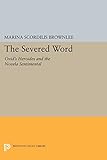The Severed Word : Ovid's Heroides and the Novela Sentimental / Marina Scordilis Brownlee.
Material type: TextSeries: Princeton Legacy Library ; 1122Publisher: Princeton, NJ : Princeton University Press, [2014]Copyright date: ©1990Edition: Course BookDescription: 1 online resource (284 p.)Content type:
TextSeries: Princeton Legacy Library ; 1122Publisher: Princeton, NJ : Princeton University Press, [2014]Copyright date: ©1990Edition: Course BookDescription: 1 online resource (284 p.)Content type: - 9780691605685
- 9781400861408
- Epistolary fiction, Spanish -- History and criticism
- Ovid, -- 43 B.C.-17 A.D. or 18 A.D. -- Heroides
- Ovid, -- 43 B.C.-17 A.D. or 18 A.D. -- Heroides.;Ovid, -- 43 B.C.-17 A.D. or 18 A.D. -- Influence.;Spanish fiction -- To 1500 -- History and criticism.;Epistolary fiction, Spanish -- History and criticism.;Separation (Psychology) in literature.;Spanish fiction -- Roman influences.;Sentimentalism in literature
- Ovid, -- 43 B.C.-17 A.D. or 18 A.D. -- Influence
- Sentimentalism in literature
- Separation (Psychology) in literature
- Spanish fiction -- Roman influences
- Spanish fiction -- To 1500 -- History and criticism
- LITERARY CRITICISM / European / Spanish & Portuguese
- 863/.209
- PQ6253 -- .B76 1990eb
- online - DeGruyter
- Issued also in print.
| Item type | Current library | Call number | URL | Status | Notes | Barcode | |
|---|---|---|---|---|---|---|---|
 eBook
eBook
|
Biblioteca "Angelicum" Pont. Univ. S.Tommaso d'Aquino Nuvola online | online - DeGruyter (Browse shelf(Opens below)) | Online access | Not for loan (Accesso limitato) | Accesso per gli utenti autorizzati / Access for authorized users | (dgr)9781400861408 |
Frontmatter -- CONTENTS -- ACKNOWLEDGMENTS -- PROLOGUE: TWO THEORIES OF UTTERANCE -- PART ONE: EPISTOLARY ANATOMY -- ONE. Victim as Artist-Epistulae Herodium -- TWO. Exemplary Counterfeit-El Bursario -- THREE. Voyeuristic Betrayal-Elegia di madonna Fiammetta -- FOUR. Mediated Discourse-Historia de duobus amantibus -- PART TWO: THE ALLEGORICAL PARADOX -- FIVE. Failed Eroticism-Siervo libre de amor -- SIX. The Untranscendent Vision-Satira de felice e infelice vida -- SEVEN. Etiological Subversion-Triste deleytaçion -- PART THREE: LINGUISTIC TRANSGRESSIONS -- EIGHT. Pandered Words-Arnalte y Lucenda -- NINE. Imprisoned Discourse-Cárce! de amor -- TEN. The Book as Galeotto-Grimalte y Gradissa -- ELEVEN. Language and Incest-Grisel y Mirabella -- EPILOGUE: Physical and Verbal Violence -- NOTES -- BIBLIOGRAPHY -- INDEX
restricted access online access with authorization star
http://purl.org/coar/access_right/c_16ec
In this wide-ranging study Marina Scordilis Brownlee investigates the importance of the letter--often a complex interplay of objectivity and subjectivity--in the establishment of novelistic discourse. She shows how Ovid's Heroides explore the discourse of epistolarity in a way that exerted a lasting effect on Italian, French, and Spanish works of the Middle Ages and Renaissance, especially on the fifteenth-century Spanish novela sentimental, or "sentimental romance." Presenting this proto-novelistic form as a highly original rewriting of Ovid, Brownlee demonstrates that its language model interrogates rather than affirms the linguistic referentiality implied by romance. Whereas the ambiguity of the sign had been articulated in fourteenth-century Spain (most notably by the Libro de buen amor), it is the fifteenth-century novela sentimental that fully grasps the existentially, novelistically dire consequences of this ambiguity. And in the process of deconstructing the referentiality that underlies romance, the novela sentimental reveals itself to be a discursively essential step in the evolution of the modern novel.Originally published in 1990.The Princeton Legacy Library uses the latest print-on-demand technology to again make available previously out-of-print books from the distinguished backlist of Princeton University Press. These editions preserve the original texts of these important books while presenting them in durable paperback and hardcover editions. The goal of the Princeton Legacy Library is to vastly increase access to the rich scholarly heritage found in the thousands of books published by Princeton University Press since its founding in 1905.
Issued also in print.
Mode of access: Internet via World Wide Web.
In English.
Description based on online resource; title from PDF title page (publisher's Web site, viewed 30. Aug 2021)


